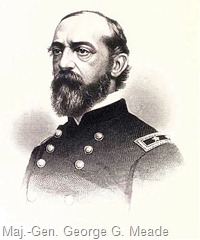October 11.—A sharp fight took place a few miles from Helena, Arkansas, between a detachment of the Fourth Iowa cavalry, under the command of Major Rector, and a superior force of Texan Rangers, commanded by Lieutenant-Colonel Giddings, resulting in a rout of the latter, nine of their number, including Lieutenant-Colonel Giddings, being captured. The Unionists had three men killed and nine wounded.—Cincinnati Gazette.
—The ship Manchester, from New-York to Liverpool, laden with grain and cotton, was captured by the rebel steamer Alabama, in lat. 41° 25′, lon. 55° 50′, when her officers and crew were taken off, with such stores as were wanted, and she was burned.—The One Hundred and Fiftieth regiment New-York volunteers, under command of Colonel John H. Ketcham, left Poughkeepsie this day for Washington.
—A force of three hundred Union cavalry, under the command of Colonel McReynolds, made a descent on the rebel Colonel Imboden’s camp, at Cacapon Bridge, about seventeen miles from Winchester, Virginia, and captured a major, lieutenant, twenty-five privates, a large number of horses and mules, one thousand blankets, a quantity of ammunition, brass cannon, wagons, firearms, clothing, and Colonel Imboden’s private papers.—Cumberland (Md.) Union.
—The rebel gunboat Palmetto State, built at Charleston, mainly through the efforts and offerings of the women of South-Carolina, was formally named and dedicated. Colonel Richard Yeadon delivered an oration on the occasion.
—The Seventh regiment Maine volunteers, one hundred and sixty-one in number, under command of Colonel Mason, left Washington this day, by order of General Halleck, on its way home to recruit its decimated ranks.
—The schooner Elmira Cornelius, while trying to run the blockade at Bull’s Bay, S. C, was this day captured by the United States steamer Restless. Her captain ran her ashore, but she was got off by the assistance of the United States steamer Flag.
—Rumors of peace began to be mooted. The Richmond Enquirer of this date says: “There are prospects of an early peace, which conclusion is founded on the results of the battles in Virginia and Maryland, and the campaign now progressing. The battle of Antietam was, to the Federal forces, the most terrible defeat of the war.”
—The United States gunboat Maratanza, Commander Scott, while lying off Cape Fear River, North-Carolina, was fired into by a rebel battery of two Armstrong guns, which the rebels had constructed on the beach during the night. The second shell struck the ship and exploded, killing two and wounding five. After which, the Maratanza immediately got under weigh and stood out to sea.—Com. Scott‘s Despatch.
—Yesterday a body of Union cavalry captured fifty wagons laden with ammunition, on the road between Camp Dick Robinson and Danville, Kentucky, and to-day a portion of General Dumont’s forces captured at Versailles, Kentucky, a train of wagons, two pieces of artillery, and three hundred and fifty rebels, without a fight.
—The preamble and resolution, submitted to the rebel House of Representatives by Mr. Barksdale, of Mississippi, concerning the retaliatory measures to be adopted against the Government of the United States, passed the House by a vote of thirty-five yeas to twenty-two nays.—(Doc. 35.)
—The schooner Revere (British, of Yarmouth, Nova Scotia) was this day captured off Cape Fear, North-Carolina, by the United States gunboats Maratanza and Monticello. Her cargo consisted of military stores.



